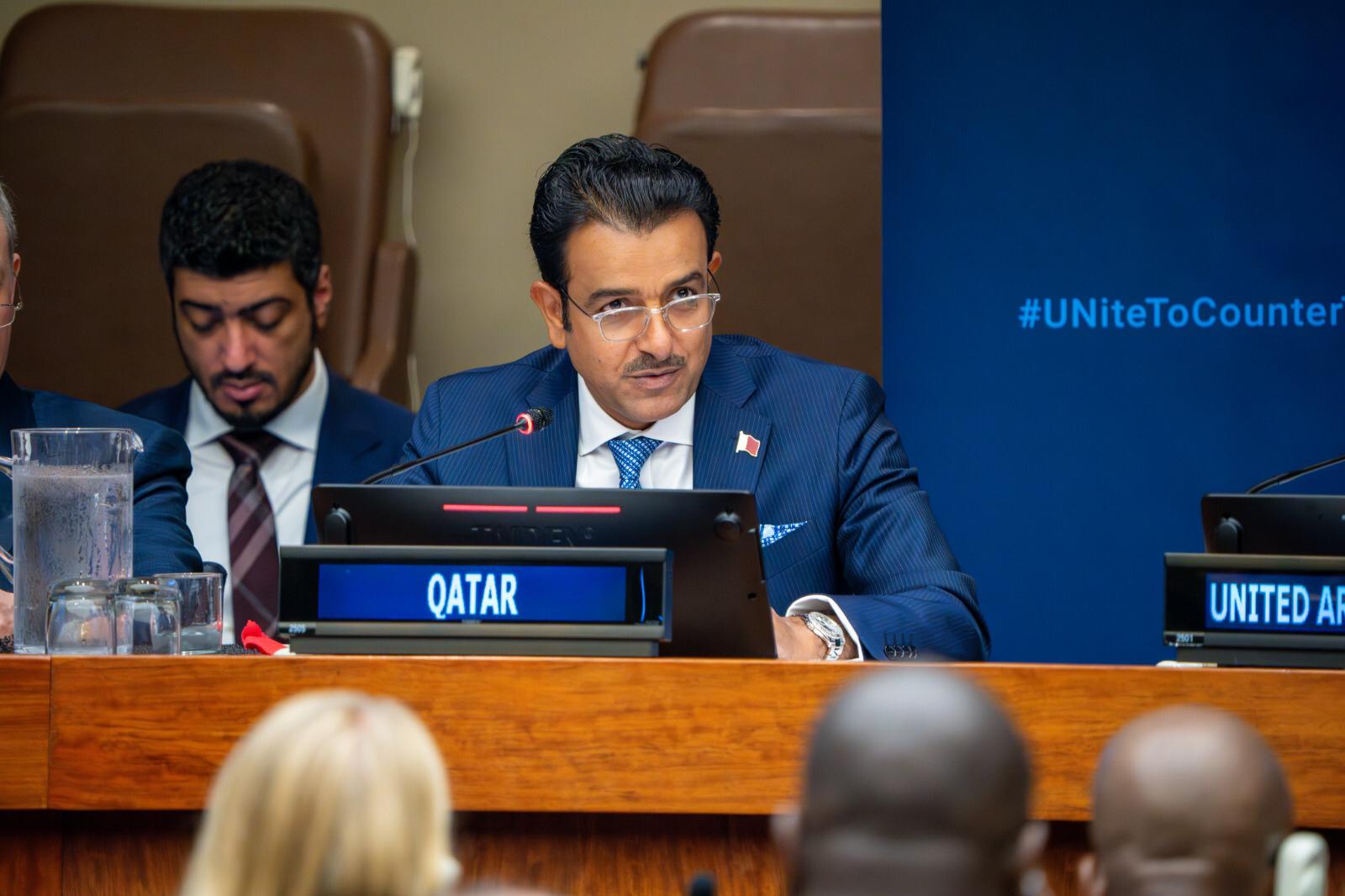Qatar Affirms Adoption of Overarching Foreign Policy Approach Based on Peace, Dispute Resolution

New York - Media & Communication Dept. - June 22
The State of Qatar affirmed Thursday that it adopts an overarching foreign policy approach based on establishing peace, settling disputes, achieving economic and social development, caring for education, employing youth, sports and protecting human rights and the rule of law. Qatar's comprehensive counter-terrorism strategy, approved in June 2022, included provisions that promote democratic practices and human rights, bolster the rule of law, preserve the rights of victims, and boost social security and peace.
This came in the State of Qatar's statement delivered by HE Special Envoy of the Minister of Foreign Affairs for Counterterrorism and Mediation in Conflict Resolution Dr. Mutlaq bin Majid Al Qahtani before the third session: Global Threat Landscape: Assessment of Current and Emerging Trends, on the margins of the UN high-level conference for heads of counter-terrorism agencies in the UN Member States in New York.
Highlighting the importance of the third session's topic because of the multifaceted, complex and constantly changing global terrorist threat landscape, His Excellency said the terror and extremist groups change their structure, methods of work, places of activity, links with organized crime, and their exploitation of conflict factors, the absence of political stability and climate change.
The international community must evaluate, keep pace with and respond appropriately to the current and emerging trends in a collective, coordinated and effective manner, HE said, stressing the need to keep pace with new threats arising from modern technologies, such as artificial intelligence, virtual financial assets, unmanned aircraft systems and 3D printing, which includes preventing the misuse of these technologies for terrorist purposes, in addition to developing ways to use them in counter-terrorism.
HE pointed out that certain regions had increasingly become the world's recent terrorism hot spots, most notably sub-Saharan Africa, the scene of half of the world's terrorism-linked victims, and Africa's the Sahel region, where the activity of the deadliest terrorist groups increases, stressing the need to focus more international efforts to combat terrorism in Africa. In this context, HE expressed the State of Qatar's aspiration for African Counterterrorism Summit to be held in Abuja, Nigeria.
HE noted that ISIS-Khorasan Province still poses a real threat to Afghanistan and the countries of the region, highlighting the great importance to take real-world and effective steps to combat it, by building the neighboring countries' capabilities to control the security of their borders, in addition to finding appropriate practical methods to work with the de facto government in Kabul and urging it to implement its obligations under the Doha Agreement. Under the accord, the Afghan government vowed to fight terrorism and not allow terrorist individuals or groups to use Afghan territories, HE said, pointing out the aspiration in this regard to further consultations with allies and international partners in order to achieve stability in Afghanistan.
In the same context, HE added that the extremely deteriorating humanitarian conditions in Syria's Al Hol Camp constitutes a real threat to international peace and security, and a constantly worsening problem that cannot be neglected. HE stressed the necessity to address the humanitarian, legal and security aspects of this crisis, especially by returning the women and children in the camp to their countries, noting the necessity of exchanging information, expertise and best practices and activating multilateralism and institutional cooperation, amid the transnational nature of terrorism.
HE stressed the State of Qatar's keenness to support the UN activities and the Qatar-UN active partnership for the pivotal role it plays in this regard, highlighting the important role of other international and regional arrangements such as the Global Counter-Terrorism Forum. HE added that the UN Global Counter-Terrorism Strategy remains the most comprehensive international framework, and therefore it must continue to be reviewed, taking into account the emerging changes and threats, and the implementation of the strategy with its four pillars.
HE welcomed the new peace plan proposed by the UN Secretary-General to assess and harmonize the UN efforts to better address strategic threats, including terrorism. To ensure the effectiveness of efforts to counter terrorism and violent extremism, it is necessary to take advantage of the latest technical and cognitive methods and means, HE added, drawing attention to the science of behavioral insights, which provides a better understanding of the motives and factors leading to extremism and terrorism and contributes to building the resilience of individuals and societies, which justifies the State of Qatar's hosting and backing for the International Hub on Behavioral Insights to Counter Terrorism, which contributes to research, capacity building, coordination and shed light on this important tool.
HE stressed the necessity to eradicate terrorism and extremism by addressing the root causes, not only the security and military aspects - a proposal backed by recent reports, such as the UN Development Program (UNDP)'s recent investigative study on extremist groups in Africa, which spotlights human rights violations as a motive for extremism and extremist groups. The study proposed that the role of economic factors in pushing young people towards extremism has doubled during the past five years, HE said, pointing out that terrorism, in general, exacerbates amid conflicts, violence and absence of stability, stressing the need for greater efforts to understand the emerging trends of extremism and terrorism fueled by xenophobia, racism, arrogance and other forms of intolerance.
HE Dr. Al Qahtani drew attention to the fact that recent studies and reports, such as the Global Terrorism Index 2022, showed an increasing rate of politically motivated terrorist attacks in the West and a great decrease of the religiously driven ones, stressing the need to address incitement that contributes to the spread of extremism and terrorism, and reiterated calls for the rejection of hate speech and intolerance that would fuel feelings including Islamophobia discourse and recent Holy Quran burning incidents in some countries.

